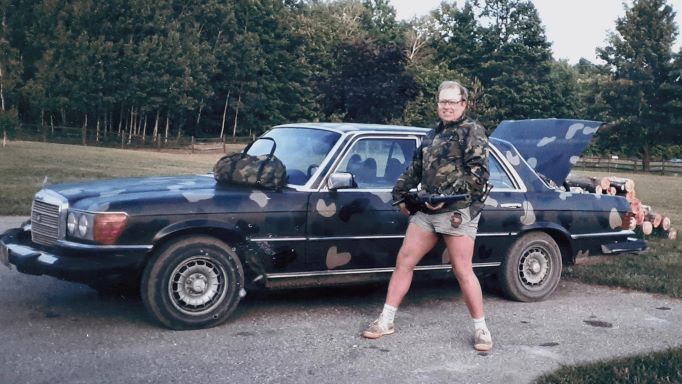After two years of pandemic shutdowns, New York City film festivals are now in full force. This month alone, the Big Apple has seen the Tribeca Film Festival come and go, Film at Lincoln Center just held its annual showcase of new Italian films, and the Brooklyn Academy of Music will hold for the first time in person since 2019 its BAMcinemaFest.
(The main difference between Tribeca and its Brooklyn cousin is mainly in scope. Tribeca screens more than 100 feature films and leans heavily toward world premieres, whereas BAM offers a smaller selection, curated mainly from other festivals, namely Sundance and SXSW, though it will host two world premieres, Amber Bemak’s 100 Ways to Cross the Border and Lynne Sachs’s Swerve.)
The Unknown Country, which premiered at SXSW, screens on BAMcinemaFest’s opening weekend, and is anchored by Lily Gladstone, who stole Certain Women and will star in Martin Scorsese’s upcoming Killers of the Flower Moon. Director Morissa Maltz has made a lyrical and languid road trip through America as Tana (Gladstone) reunites with her estranged Oglala Lakota family for her sister’s marriage. Tana, who left South Dakota at age eight, had been the full-time caretaker of a grandmother, who recently passed away, in Minneapolis. Her cross-country adventure of discovery will lead her to follow her grandmother’s footsteps in Texas, with pit stops along the way. Besides the views from the road, the film offers a refreshing and empathetic look at ordinary people living their lives, raising families, and holding down jobs, whether on the reservation or off.
Arriving by way of the Locarno Film Festival and Slamdance, Kit Zauhar’s Actual People offers a raw yet familiar outlook. The writer/director stars as Riley, who is about to graduate from a Brooklyn private university—though she’s failing one class. She parties and drinks a lot, and has absolutely no idea what she’s going to do after college. Riley also obsesses over a young man and practically stalks him on Instagram. He’s the first guy she’s hooked up with who is biracial like her, Asian and White. The filmmaker directs these coming-of-age rites of passage with a candid and upfront touch. Although the camera person may not always have solid footing, based on the shakiness of the camera work, the same cannot be said for the fresh and true-to-life cast.
If diamonds are a girl’s best friend, then they are likely phonies, given that the synthetic diamond industry has taken off and has spread into the jewelry market. That’s according to Jason Kohn’s Nothing Last Forever, a straightforward, globe-hopping exposé. Now it’s possible that almost any diamond may also be partially artificial. The tart-tongued talking heads, especially designer Aja Raden (“Everything could be faked”), take no prisoners. The dish the documentary serves up will hold viewers’ attention, even those who have never bought an engagement ring.
Director Ramin Bahrani’s (White Tiger) first documentary, 2nd Chance, an absorbing, cringey, and multidimensional look at a self-made entrepreneur, makes its New York City debut here. In his introduction to the film at Sundance, Bahrani called this film, “a strange version of All My Sons.” Richard Davis’s company, Second Chance, thrived in the 1980s and onward, producing bulletproof vests for police around the country. To prove that his products worked, he shot himself in the stomach 192 times, often on camera. Bahrani traces Davis’s rise and fall through the copious homemade, lo-fi promotional videos and reenactments of police shootings. However, as a narrator of his biography, Davis, a man who never shied away from publicity, may not be exactly reliable. (According to ex-wife Kathleen David, “He’s truly an operatic character.”) If I had to pick just one film to see at the fest, this ultimately moving movie would be it.
BAMcinemaFest runs from June 23–30.


















Leave A Comment